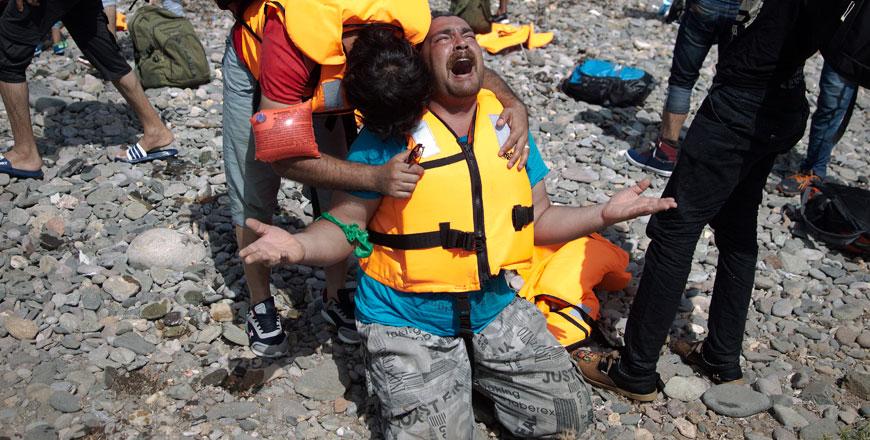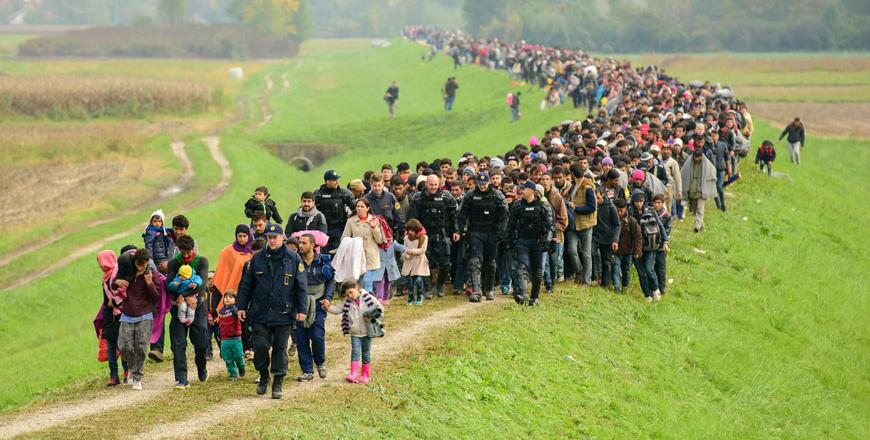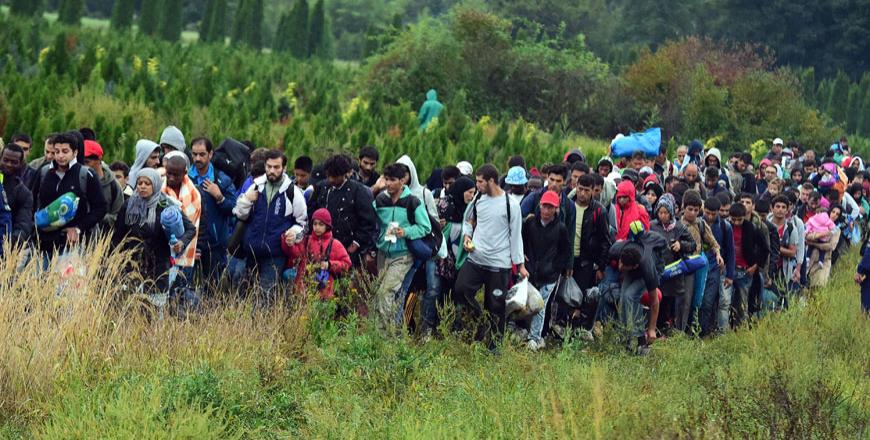You are here
Hit by new wave of refugees, Germany warns EU partners
By Reuters - Sep 07,2015 - Last updated at Sep 07,2015

Syrian refugees react as they arrive after crossing aboard a dinghy from Turkey, on the island of Lesbos, Greece, on Monday (AP photo)
BERLIN/MUNICH — Struggling to cope with a record influx of asylum seekers, Germany told its European partners on Monday they must take in more refugees too, saying the burden could not fall on just a few countries.
Chancellor Angela Merkel, speaking after a weekend in which some 20,000 migrants made their way to Germany from Hungary by train, bus and on foot, described the events of the past days as "breathtaking" and tried to reassure German citizens that the crisis was manageable.
"I am happy that Germany has become a country that many people outside of Germany now associate with hope," she said at a news conference in Berlin. "This is something to cherish when you look back at our history."
But she and her vice chancellor, Sigmar Gabriel, coupled their message of optimism with a warning to European Union partners who have resisted a push from Berlin, Paris and Brussels to agree quotas for refugees flowing in mainly from Syria, Iraq and Afghanistan.
"What isn't acceptable in my view is that some people are saying this has nothing to do with them," Merkel said. "This won't work in the long run. There will be consequences although we don't want that."
Gabriel said that if countries in eastern Europe and elsewhere continued to resist accepting their fair share of refugees, the bloc's open border regime, known as Schengen, would be at risk.
"This would be a dramatic political blow for Europe, but also a heavy economic blow, also for those countries that are saying they don't want to help now," he said.
Only months after Europe narrowly averted a Greek exit from the euro zone, the refugee crisis has emerged as the bloc's biggest challenge, exposing deep strains.
European Commission President Jean-Claude Juncker is due to unveil new proposals on Wednesday on how to distribute refugees among member states.
An EU source told Reuters that under his plan, Germany would take on more than 40,000 and France 30,000 of the 160,000 asylum seekers the Commission says need to be relocated from Italy, Greece and Hungary, the main entry points to the EU for refugees arriving by sea and land.
The 160,000 that Juncker wants to redistribute within the EU are just a fraction of the many hundreds of thousands of refugees and economic migrants from Asia, Africa and the Middle East that have reached Europe this year on leaky boats across the Mediterranean or over land through the Balkan peninsula.
Germany has announced it is letting Syrians seek asylum regardless of where they enter the EU, suspending normal rules and accelerating a flow of migrants north and west from the edges of the EU.
Just last month, more than 100,000 asylum seekers reached Germany, which is preparing for 800,000 this year, around 1 per cent of its population, a move with little precedent for a large Western country.
Other European countries, notably Britain which would be exempt from Juncker's scheme, have barely budged on the refugee issue. London has taken in just 216 Syrians under a special scheme, while granting asylum to around 5,000 who managed to reach Britain on their own during four years of civil war.
But dramatic images from last week, especially a photograph of a Syrian toddler drowned on a Turkish beach, have created new political pressure to open doors, even in countries that argued previously that taking in too many migrants could make the problem worse by encouraging others to make dangerous voyages.
Pope Francis called over the weekend for Christian communities across the continent to offer sanctuary.
Hungary's prime minister Viktor Orban, a right-wing populist whose hard line during the crisis has drawn both praise and criticism, reiterated his opposition to quotas on Monday, calling this debate premature. Juncker's proposal would exempt the main entry countries Hungary, Greece and Italy from taking relocated refugees.
"As long as Europe cannot protect its external borders it makes no sense to discuss the fate of those flowing in," Orban said, defending a planned package of laws that would allow the army to be deployed to defend Hungary's southern border.
Preferred destination
Rich and welcoming Germany has become the preferred destination for most migrants.
Other countries have resisted taking in refugees, with Poland arguing that it is already burdened by an influx of people from neighbouring Ukraine, and Slovakia refusing to take in Muslims.
Christoph Hillenbrand, a senior official in Bavaria, the southern German state that has become the entry point for migrants arriving from Hungary via Austria, told reporters on Monday that 2,500 new asylum seekers were likely to arrive in Germany by early afternoon.
German and Austrian officials appear to have been caught off guard by the numbers.
Austrian Chancellor Werner Faymann had said on Sunday he expected the situation to return to normal as emergency measures allowing refugees to cross from Hungary into Austria and then Germany were phased out.
"It has now reached a volume that is already considerable," Hillenbrand, president of the government of Upper Bavaria, told reporters at Munich train station. "We will still do our best to create new places but we are pushing against the limits now."
He said buses with a capacity to carry 1,000 people north to cities like Dortmund, Hamburg, Braunschweig and Kiel had been made available, but that migrants had also been streaming out of temporary accommodation facilities on foot.
"It's not possible to think any longer about registering people at all," Hillenbrand said.
Merkel's welcome to migrants has been praised by human rights groups. But over the weekend there were signs of dissent within her conservative camp, with officials from the Bavarian Christian Social Union (CSU), sister party of her Christian Democrats, criticising her handling of the crisis.
"There is no society that could cope with something like this," CSU leader and Bavarian premier Horst Seehofer said. "The federal government needs a plan here."
While many Germans have been welcoming of the refugees, there have also been repeated attacks on shelters, including two early on Monday.
In Rottenburg, in the western state of Baden-Wuerttemberg, five people were injured in a fire at an asylum shelter housing 80 refugees. Another suspected arson attack occurred in Rockensussra, in the eastern state of Thurinigia, where three empty buildings slated to house refugees were destroyed in a fire.
At a Sunday evening meeting, leaders from Merkel's governing coalition agreed to free up an additional six billion euros to pay for the record influx.
They also agreed to speed up asylum decisions, reduce cash benefits for first arrivals, and to widen the list of countries deemed "safe" — meaning their citizens generally have no claim to asylum — to include all Balkan states.
"We should not pretend that this is a small task," Gabriel said of the crisis. "We need to be realistic. We can take on 800,000 asylum seekers this year, find homes for them and help them integrate. But it should also be clear to everyone that this can't continue every year. We need a new European asylum policy."
Related Articles
BERLIN — Germany said it could take half-a-million refugees annually to help Europe's migrant crisis as Greece's Aegean islands struggled Tu
SOFIA — Bulgaria, Romania and Serbia Saturday threatened to close their borders if EU countries stopped accepting migrants, as European lead
BRUSSELS/ LEIPZIG, Germany — Biitterly divided European leaders will seek to find a credible response to the continent's worst migration cri



















